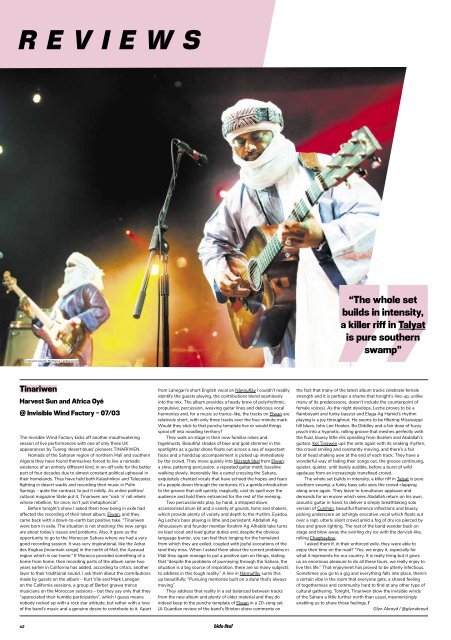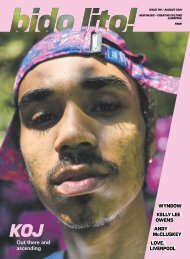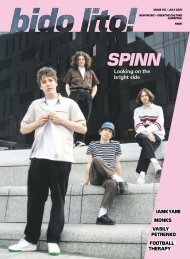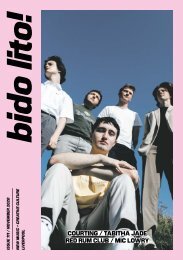Issue 76 / April 2017
April 2017 issue of Bido Lito! magazine. Featuring: ALI HORN, WILD BEASTS, MARY MILLER, TINARIWEN, MIC LOWRY, I SEE RIVERS and much more.
April 2017 issue of Bido Lito! magazine. Featuring: ALI HORN, WILD BEASTS, MARY MILLER, TINARIWEN, MIC LOWRY, I SEE RIVERS and much more.
You also want an ePaper? Increase the reach of your titles
YUMPU automatically turns print PDFs into web optimized ePapers that Google loves.
REVIEWS<br />
“The whole set<br />
builds in intensity,<br />
a killer riff in Talyat<br />
is pure southern<br />
swamp”<br />
Tinariwen (Aaron McManus / ampix.co.uk)<br />
Tinariwen<br />
Harvest Sun and Africa Oyé<br />
@ Invisible Wind Factory - 07/03<br />
The Invisible Wind Factory kicks off another mouthwatering<br />
season of live performances with one of only three UK<br />
appearances by Tuareg ‘desert blues’ pioneers TINARIWEN.<br />
Nomads of the Saharan region of northern Mali and southern<br />
Algeria they have found themselves forced to live a nomadic<br />
existence of an entirely different kind, in on-off exile for the better<br />
part of four decades due to almost constant political upheaval in<br />
their homelands. They have held both Kalashnikov and Telecaster,<br />
fighting in desert wadis and recording their music in Palm<br />
Springs – quite the contrast, to put it mildly. As online politico/<br />
cultural magazine Slate put it, Tinariwen are “rock ‘n’ roll rebels<br />
whose rebellion, for once, isn’t just metaphorical”.<br />
Before tonight’s show I asked them how being in exile had<br />
affected the recording of their latest album, Elwan, and they<br />
came back with a down-to-earth but positive take. “Tinariwen<br />
were born in exile. The situation is not shocking: the new songs<br />
are about today’s issues and problems. Also, it gave us the<br />
opportunity to go to the Moroccan Sahara where we had a very<br />
good recording session. It was very inspirational, like the Adrar<br />
des Ifoghas [mountain range] in the north of Mali, the Azawad<br />
region which is our home.” If Morocco provided something of a<br />
home from home, then recording parts of the album some two<br />
years earlier in California has added, according to critics, another<br />
layer to their traditional sound. I ask them about the contributions<br />
made by guests on the album – Kurt Vile and Mark Lanegan<br />
on the California sessions, a group of Berber gnawa trance<br />
musicians on the Moroccan sessions – but they say only that they<br />
“appreciated their humble participation”, which I guess means<br />
nobody rocked up with a rock star attitude, but rather with a love<br />
of the band’s music and a genuine desire to contribute to it. Apart<br />
from Lanegan’s short English vocal on Nànnuflày I couldn’t readily<br />
identify the guests playing, the contributions blend seamlessly<br />
into the mix. The album provides a heady brew of polyrhythmic,<br />
propulsive, percussion, weaving guitar lines and delicious vocal<br />
harmonies and, for a music so trance-like, the tracks on Elwan are<br />
relatively short, with only three tracks over the four-minute mark.<br />
Would they stick to that punchy template live or would things<br />
spiral off into noodling territory?<br />
They walk on stage in their now familiar robes and<br />
tagelmusts. Beautiful shades of blue and gold shimmer in the<br />
spotlights as a guitar drone floats out across a sea of expectant<br />
faces and a handclap accompaniment is picked up immediately<br />
by the crowd. They move quickly into Nizzagh Ijbal from Elwan:<br />
a slow, pattering percussion, a repeated guitar motif, bassline<br />
walking slowly, inexorably like a camel crossing the Sahara,<br />
exquisitely chanted vocals that have echoed the hopes and fears<br />
of a people down through the centuries; it’s a gentle introduction<br />
to the groove that will quickly, magically, cast its spell over the<br />
audience and hold them entranced for the rest of the evening.<br />
Two percussionists play, by hand, a stripped down,<br />
accessorised drum kit and a variety of gourds, toms and shakers,<br />
which provide plenty of variety and depth to the rhythm. Eyadou<br />
Ag Leche’s bass playing is lithe and persistent; Abdallah Ag<br />
Alhousseyni and founder member Ibrahim Ag Alhabib take turns<br />
on lead vocal and lead guitar duties and, despite the obvious<br />
language barrier, you can feel their longing for the homeland<br />
from which they are exiled, coupled with joyful evocations of the<br />
land they miss. When I asked them about the current problems in<br />
Mali they again manage to put a positive spin on things, stating<br />
that “despite the problems of journeying through the Sahara, the<br />
situation is a big source of inspiration, there are so many subjects<br />
to address in this tough reality.” A line in Nànnuflày sums this<br />
up beautifully: “Pursuing memories built on a dune that’s always<br />
moving”.<br />
They address that reality in a set balanced between tracks<br />
from the new album and plenty of older material and they do<br />
indeed keep to the punchy template of Elwan in a 20-song set.<br />
(A Guardian review of the band’s Brixton show comments on<br />
the fact that many of the latest album tracks celebrate female<br />
strength and it is perhaps a shame that tonight’s line-up, unlike<br />
many of its predecessors, doesn’t include the counterpoint of<br />
female voices). As the night develops, Leche proves to be a<br />
flamboyant and funky bassist and Elaga Ag Hamid’s rhythm<br />
playing is a joy throughout. He seems to be filtering Mississippi<br />
hill blues, John Lee Hooker, Bo Diddley and a fair dose of fuzzy<br />
psych into a hypnotic, rolling groove that meshes perfectly with<br />
the fluid, bluesy little rills spiralling from Ibrahim and Abdallah’s<br />
guitars. Kel Tinawen ups the ante again with its snaking rhythm,<br />
the crowd smiling and constantly moving, and there’s a fair<br />
bit of head shaking awe at the end of each track. They have a<br />
wonderful way of fading their songs out, the groove continuing,<br />
quieter, quieter, until barely audible, before a burst of wild<br />
applause from an increasingly transfixed crowd.<br />
The whole set builds in intensity, a killer riff in Talyat is pure<br />
southern swamp, a funky bass solo sees the crowd clapping<br />
along once again. They leave to tumultuous applause and<br />
demands for an encore which sees Abdallah return on his own,<br />
acoustic guitar in hand, to deliver a simply breathtaking solo<br />
version of Curshan, beautiful flamenco inflections and bluesy<br />
picking underscore an achingly evocative vocal which floats out<br />
over a rapt, utterly silent crowd amid a fog of dry ice pierced by<br />
blue and green lighting. The rest of the band wander back on<br />
stage and blow away the swirling dry ice with the dervish-like,<br />
rolling Chaghaybou.<br />
I asked them if, in their enforced exile, they were able to<br />
enjoy their time on the road? “Yes, we enjoy it, especially for<br />
what it represents for our country. It is really tiring but it gives<br />
us an enormous pleasure to do all these tours, we really enjoy to<br />
live this life.” That enjoyment has proved to be utterly infectious.<br />
Sometimes you go to a gig and everything falls into place, there’s<br />
a certain vibe in the room that everyone gets, a shared feeling<br />
of togetherness and community hard to find at any other type of<br />
cultural gathering. Tonight, Tinariwen blow the invisible winds<br />
of the Sahara a little further north than usual, mesmerizingly<br />
enabling us to share those feelings. !<br />
Glyn Akroyd / @glynakroyd<br />
42


















